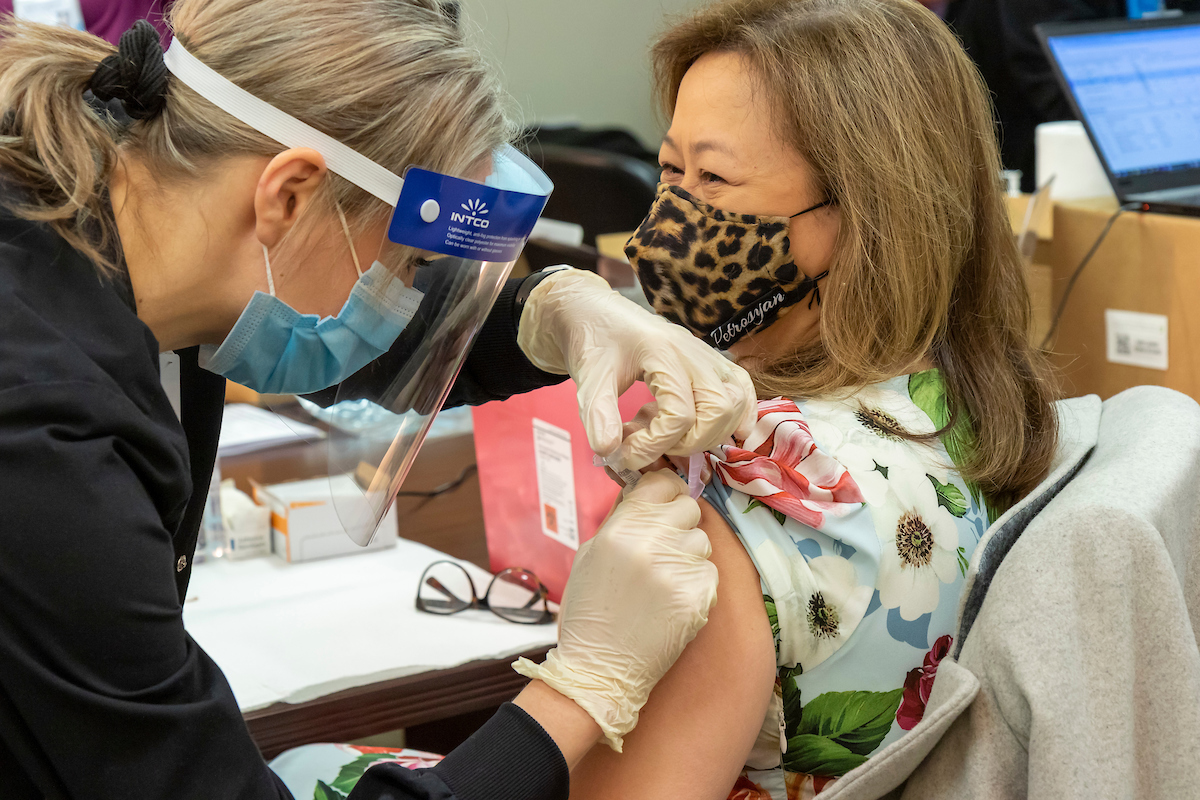<< Back
So You’ve Been Vaccinated: Here’s What You Can (or Can’t) Do

February 03, 2021
The photos are all over social media, with healthcare workers, first-responders, grandmas and grandpas all giving the thumbs-up in front of a banner that reads “I got the shot!” or “I’m crushing COVID!”
To date, Connecticut has vaccinated 64,379 people with both doses, and 300,000 with their first dose. The state ranks in the Top 3 in the country for administering the COVID vaccine.
But what does it mean when you receive the first or both doses? Does life return to your pre-pandemic normal?
We collected some of the most common questions we’re hearing, and asked Dr. Virginia Bieluch, Chief of the Division of Infectious Diseases at The Hospital of Central Connecticut, for some answers. (Please be patient when seeking an appointment: The state is currently not receiving enough doses from the federal government to meet demand.)
“Vaccination is an important tool in helping us end the COVID-19 pandemic,” she said. “We know that the vaccine decreases your chance of becoming ill or seriously ill with COVID-19. But scientists are still evaluating whether vaccinated people can still carry the virus and transmit it to others. So current recommendations to wear masks, social distance, avoid crowds, avoid poorly ventilated areas, and wash/sanitize hands are still important in combating this pandemic.”
Now That I’m Vaccinated, Am I Safe?
Studies show you have about 94 percent to 95 percent protection against becoming sick or seriously sick with COVID-19 after you receive one of the two available mRNA vaccines. There is still some chance you can get sick with COVID, especially if there is still a lot of virus circulating in your community. It’s important to continue to practice mask-wearing, social distancing, avoiding crowds, maintaining good ventilation and hand hygiene.
No More Masks? I Can Hug Everyone?
Studies on vaccines were designed to look for their effect on development of COVID-19 illness. We do not have enough information yet to say how effective vaccines are at preventing the virus from being found in a vaccinated person’s respiratory tract. If the virus is in your respiratory tract following vaccination, you could spread the virus to your close contacts such as family, friends and co-workers, so you need to wear your mask to prevent spread of the virus for now.
Can I Visit my Elderly Mom or Aunt or Neighbor?
Once older people are vaccinated, they are 94 percent to 95 percent protected from becoming sick with COVID-19. This is good news, but protection is not 100 percent and elderly individuals are at risk of serious disease with COVID. Also, we do not yet know if vaccinated individuals can spread the virus to others if they come in contact with it.
I’ve Had the First Shot: Does That Mean I’m Halfway Safe?
Data suggests that 10-14 days after your first injection of one of the mRNA vaccines you start to have partial protection against getting sick. We do not know how long this protection lasts so it is important to get your second shot for an increased, longer level of protection.
Can I Hang Around With People Who Have Been Vaccinated, Too? No Masks?
Vaccines are not 100 percent effective and scientists are still studying whether vaccinated individuals are protected from carrying the virus in their respiratory tract and spreading the virus to others. Experts are continuing to study protection provided by vaccination in real world conditions. They will also need to monitor how the virus is spreading in communities and how many people are vaccinated before changing any recommendations.